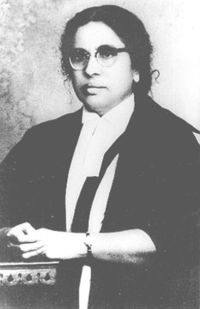Justice Anna Chandy (1905–1996), also known as Anna Chandi, was the first female judge (1937) and then High Court judge (1959) in India. She was, in fact, one of the first female judges in the British Empire next to Emily Murphy.[1]
Anna Chandy | |
|---|---|
 Justice Anna Chandy | |
| Born | Anna 5 April 1905 |
| Died | 20 July 1996 (aged 91) |
| Nationality | Indian |
| Alma mater | |
| Occupation | Judge |
| Employer | Kerala High Court |
| Known for | First woman Judge of India, First woman Judge in commonwealth countries |
| Title | Hon. Justice |
| Term | 9 February 1959 to 5 April 1967 |
Life
editAnna Chandy was born in 1905, in the erstwhile kingdom of Travancore and raised in Trivandrum.[2] She was an Anglican Syrian Christian who embraced Catholicism, in later life.[3][4] After obtaining a post-graduate degree from Government Law College, Thiruvananthapuram in 1926, she became the first woman in her state to get a law degree. She was called to the Bar and practiced as a barrister from 1929 onwards. In 1931–32, she contested elections to the legislative assembly of Travancore princely state and was elected; she served as a legislator during the period 1932–34.
In 1937, Chandy was appointed as a munsif in Travancore by the Maharaja upon the advice of his Dewan (First Minister), Sir C.P. Ramaswami Iyer. This made Chandy the first female judge in India. In 1948, she was raised to the position of District Judge.[5][6] She became the first female judge in an Indian high court when she was appointed to the Kerala High Court on 9 February 1959. She remained in that office until her retirement on 5 April 1967.[7] In her retirement, Chandy served on the Law Commission of India and also wrote an autobiography titled Atmakatha (1973). She died in 1996.[5]
Throughout her career as a lawyer, politician, and judge, Chandy simultaneously promoted the cause of women's rights, most notably through, a woman's magazine that she founded and edited.[5] Often described as a "first generation feminist", Chandy campaigned for election to the Shree Mulam Popular Assembly in 1931.[5][8] She met with hostility from both her competition and newspapers[9] but was elected for the period 1932–34.
See also
editReferences
edit- ^ "'Manu and the 'muse'". The Telegraph India. 4 June 2016. Archived from the original on 7 June 2016.
- ^ Devika, J. (2005). Her-self: Early Writings on Gender by Malayalee Women, 1898–1938. Popular Prakashan. p. 113. ISBN 978-81-85604-74-9.
- ^ Mosse, Kate (13 October 2022). Warrior Queens & Quiet Revolutionaries: How Women (Also) Built the World. Pan Macmillan. p. 115. ISBN 978-1-5290-9221-9.
- ^ Chandy, Anna (1973). Athmakatha (The autobiography of Anna Chandy). Thrissur: Carmel Books.
- ^ a b c d Devika J. (2005). Herself. Popular Prakashan. p. xxiv. ISBN 9788185604749.
- ^ "First to appoint a lady advocate – Mrs. Anna Chandy — as District Judge". Archived from the original on 5 July 2008. Retrieved 27 May 2008.
- ^ "Former Judges of High Court of Kerala". Retrieved 27 May 2008.
- ^ Raman, K. Ravi, ed. (2010). Development, Democracy and the State: Critiquing the Kerala Model of Development. Routledge. p. 179. ISBN 9781135150068.
- ^ Mukhopadhyay, Swapna, ed. (2007). The Enigma of the Kerala Woman: A Failed Promise of Literacy. Berghahn Books. p. 113. ISBN 9788187358268.
((1. https://web.archive.org/web/20120304222528/http://keralawomen.gov.in/view_page.php?type=11&id=262))